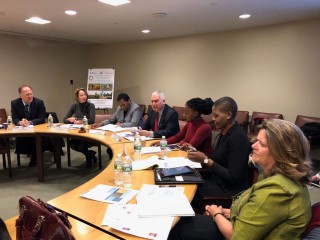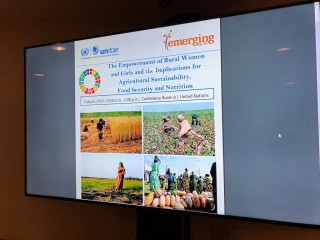World Milk Day 2024 Report – Celebrating Dairy’s Vital Role in Nutrition and Sustainability
This year, on June 1, we celebrated the vital role that dairy plays in delivering…
The 62nd Session of the Commission on the Status of Women (CSW 62) is currently taking place in New York until 23rd March 2018. This year’s theme is “Challenges and opportunities in achieving gender equality and the empowerment of rural women and girls.”
On 6th March, in the lead up to CSW-62, Emerging Ag and the United Nations Institute for Training and Research (UNITAR) held a training seminar aimed at raising awareness on the role played by the agricultural sector and rural women and girls in the quest for sustainable development and the achievement of the SDGs, particularly Goal 2 on Zero Hunger and Goal 5 on Gender Equality. The module explored the six principles that undergird sustainable agriculture: safeguarding natural resources; sharing knowledge; building local access and capacity; protecting harvests; enabling access to markets; and prioritising research imperatives.
Mr. Marco A. Suazo, Head of UNITAR New York Office, opened the session. The keynote speaker was H.E. Ms. Pennelope Beckles, Ambassador/Permanent Representative of Trinidad and Tobago to the United Nations, who emphasized the crucial contributions rural women and girls make to agricultural income and production.
 The training was arranged in two separate panel sessions, the first of which focused on Agriculture and the SDGs. Ms. Thato Moagi, Farmer and Managing Director of Legae La Banareng Farms and a young female farmer from South Africa, stressed the need to provide a competitive and accessible market for rural women to increase of their financial status. Mr. Randall Purcell, senior advisor from the World Food Program (WFP), noted that the decreasing number of young farmers is a key cause of concern for rural development, as fewer and fewer youths are interested in farming as a profession. He noted that the question of how to attract young people to farming and other agriculture-related pursuits is a challenge. Ms. Tamisha Lee, a Jamaican farmer and president of the Jamaica Network of Rural Women Producers (JNRWP) highlighted the importance of women being at the center of discussions on agricultural issues that pertain to rural development.
The training was arranged in two separate panel sessions, the first of which focused on Agriculture and the SDGs. Ms. Thato Moagi, Farmer and Managing Director of Legae La Banareng Farms and a young female farmer from South Africa, stressed the need to provide a competitive and accessible market for rural women to increase of their financial status. Mr. Randall Purcell, senior advisor from the World Food Program (WFP), noted that the decreasing number of young farmers is a key cause of concern for rural development, as fewer and fewer youths are interested in farming as a profession. He noted that the question of how to attract young people to farming and other agriculture-related pursuits is a challenge. Ms. Tamisha Lee, a Jamaican farmer and president of the Jamaica Network of Rural Women Producers (JNRWP) highlighted the importance of women being at the center of discussions on agricultural issues that pertain to rural development.
In the second panel on Women’s Participation in and Contributions to Agriculture, Mr. Zak Bleicher, Partnership Officer at IFAD, detailed the difficult choices rural women face today. He explained that old fashioned patriarchal environments, particularly in developing countries, can make it extremely difficult for women farmers to gain leadership positions or effect beneficial policy changes. Ms. Carla Mucavi, Director of the FAO Liaison Office in New York, stressed the need to focus on nutrition issues in rural areas, even as we focus on equality issues. Ms. Nicoline de Haan, Gender Lead at the International Livestock Research Institute (ILRI) vividly explored the relationships between rural women and their livestock. She pointed out that livestock have the potential to improve the financial situation of women but, on the other hand, caring for livestock can take a lot of energy and time. She also described how rural women bear much of the burden for household tasks and noted that there needs to be a shift towards fair distribution of labor and mutual respect between women and men.
 Some of the proposals from panelists for improving the situation of rural women and girls included giving women farmers greater autonomy over their farms; developing investment initiatives that directly benefit women farmers; and helping rural farmers increase their capacity to manage risk, add value to their products and increase profits.
Some of the proposals from panelists for improving the situation of rural women and girls included giving women farmers greater autonomy over their farms; developing investment initiatives that directly benefit women farmers; and helping rural farmers increase their capacity to manage risk, add value to their products and increase profits.
The course was well received by a balanced and diverse audience, including Member State delegates from various UN Committees, Mission staff, and multi-stakeholder representatives from the civil society and private sectors. The seminar was a fruitful partnership between UNITAR and Emerging Ag, and, in pursuit of the implementation of SDG 2 and SDG 5, it successfully fulfilled its objective of increasing awareness of the situation and challenges of rural women and girls.